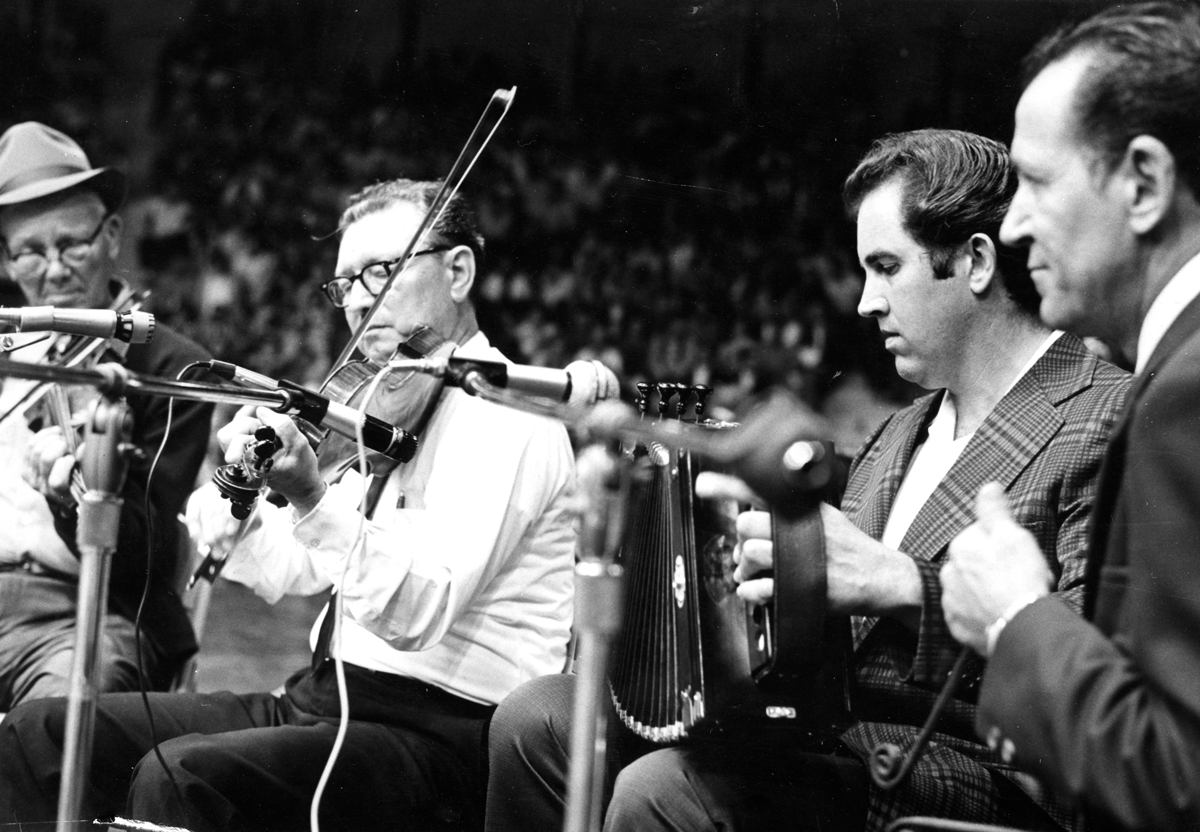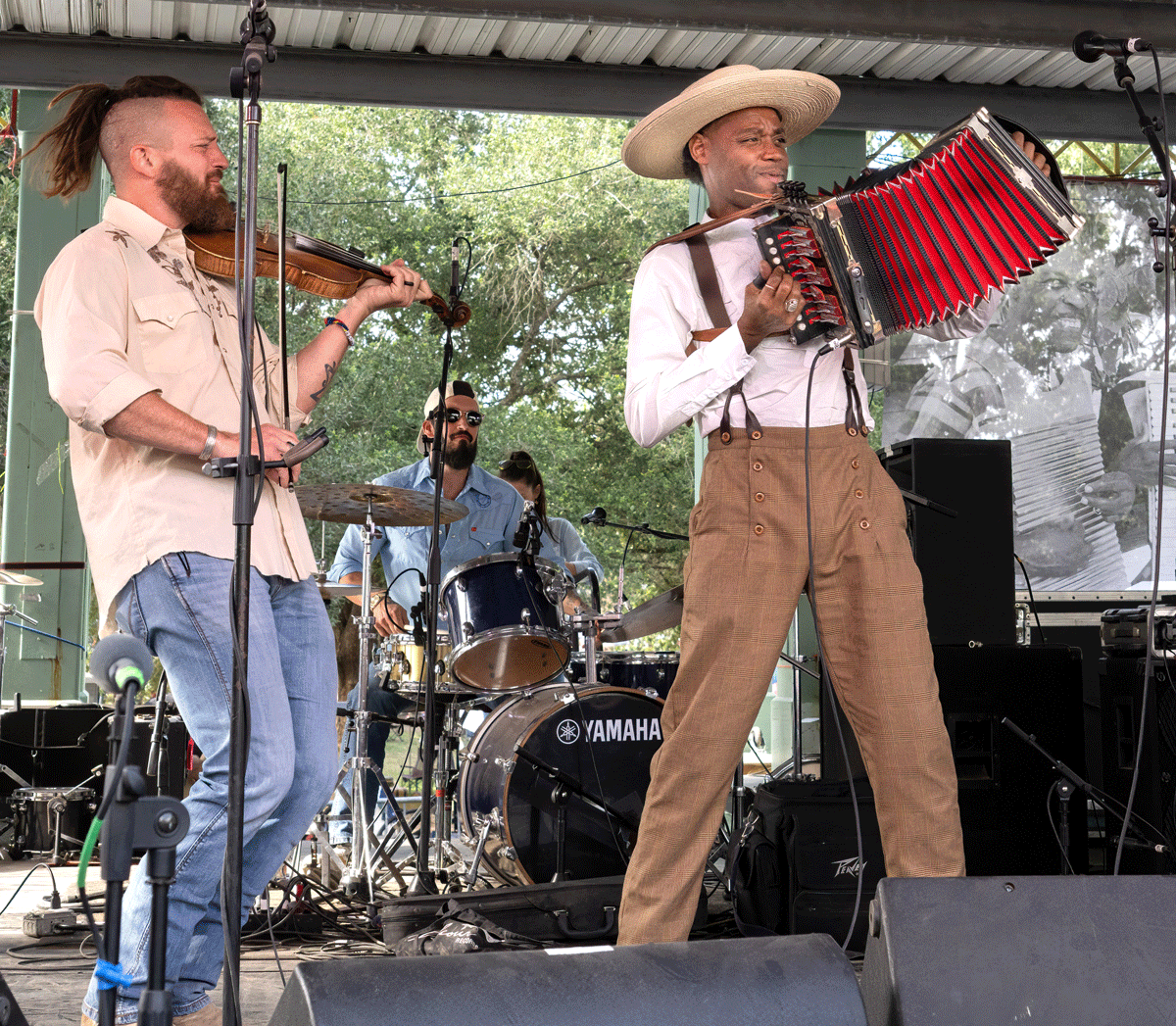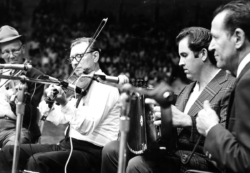Fall 2024
A Major Milestone for the Music of French Louisiana
Fifty years of Festivals Acadiens et Créoles
Published: September 1, 2024
Last Updated: December 1, 2024

Festivals Acadiens et Créoles
Left to right: Varise Connor, Lionel Lelux, Marc Savoy, and Don Montoucet performing at “A Tribute to Cajun Music,” the concert that would grow into Festivals Acadiens, in 1974.
The present robust popularity of Cajun and Creole music, zydeco, and swamp pop belies the fact that, until fifty years ago, these interconnected genres were often scorned, excoriated, and marginalized. In 1974 French-speaking Louisianans had endured a half-century of linguistic and cultural disrespect exerted by aggressive governmental campaigns of forced assimilation. Between 1916 and 1921 the Louisiana legislature enacted laws forbidding children to speak French in the state’s public schools. These edicts sought to impose subservient conformity to mainstream American identity by making French-speakers ashamed of their ethnicity—including such important self-expressions as music.
This climate of intolerant condescension was reinforced via the bully-pulpit dominance of mass-media coverage in English. In 1964 the Cajun fiddler Dewey Balfa performed at the prestigious Newport Folk Festival in Rhode Island, receiving a standing ovation. The following year a group of Newport festival folklorists traveled to Louisiana in search of performers for the 1965 event. Their visit caught the negative attention of one Burton Grindstaff, editor of the Opelousas Daily World, who went off on an ethnocentric tirade bearing the headline “They Call That Music??!!” Grindstaff’s rant was rooted in fear that such “music??!!” made Louisiana look like a crude, uncivilized backwater to national audiences. This prevalent attitude also reflected the broader problem that the state’s Cajun/Creole music had gone out of vogue in the ’60s, severely limiting opportunities for working musicians.
A decade later, a powerful cultural renaissance began sweeping South Louisiana; self-respect, pride, and reverence for tradition replaced indoctrinated shame. One notable manifestation was the creation of the New Orleans Jazz & Heritage Festival. In Lafayette, a recently formed organization known as CODOFIL—the Council for the Development of French in Louisiana—set up educational exchange programs with French-speaking nations from around the world. Cultural activists, folklorists, researchers, and preservationists—including Barry Ancelet, Ann Allen Savoy, Michael Doucet, and Nick Spitzer—put considerable effort into locating and documenting older Cajun and Creole musicians whose archaic repertoires were in danger of dying out. (In this article, “Creole” denotes Black people of Afro-Caribbean ancestry who speak French or have ancestors who did. This definition does not discount the differing interpretations of “Creole.”) Newly formed bands such as BeauSoleil fused Cajun music with elements of contemporary rock and jazz, bringing it to a broad new audience. One important milestone in this resurgent movement’s attainment of critical mass was the concert A Tribute to Cajun Music, held at Blackham Coliseum in Lafayette on March 26, 1974. Co-produced by Barry Ancelet, Kaith Cravey, and the staff of CODOFIL, the concert featured, among many others, such masters as Clifton Chenier, “the king of zydeco”; Dewey Balfa; the Cajun fiddler and recording pioneer Dennis McGee; Cajun accordionists Marc Savoy and Nathan Abshire; the Creole accordion-fiddle duo of Alphonse “Bois Sec” Ardoin and Canray Fontenot; the Creole a cappella ballad singer Inez Catalon and the Cajun a cappella ballad singer Marcus Landry, both of whose repertoires included songs with medieval roots. To emphasize the music’s cultural significance, no dance floor nor dancing space was provided at the concert, so that the audience would focus on listening, absorbing, and learning. The concert drew well over eight thousand people and was considered a great success.
In 1976 this admission-free event was moved outdoors; dancing was allowed, and attendees could come and go as they pleased. Live music was combined with craft and cooking demonstrations, and the gathering was named Festivals Acadiens. In 2008 the event name expanded to the more inclusive Festivals Acadiens et Créoles, in response to concerns that insufficient recognition had been accorded to the Creole music community. In 2014 the festival celebrated its fortieth anniversary, marked by the publication of Ancelet’s book One Generation at a Time. A symposium honored both that milestone and the legacy of John and Alan Lomax’s 1934 trip to Louisiana to make folkloric field recordings for the Library of Congress. The Lomaxes documented a treasure trove of invaluable archaic material that continues to be reprised and reinvented. Symposia will again be scheduled this year as the festival celebrates its fiftieth anniversary October 11–13.

Jourdan Thibodeaux, Adam Cormier, and Cedric Watson of Thibodeaux’s band les Rôdailleurs performing at a recent Festivals Acadiens et Créoles. Photo by David Simpson, Festivals Acadiens et Créoles
Today Festivals Acadiens et Créoles stands as a major annual event on Lafayette’s cultural calendar. It also attracts many visitors from far afield, including performers from Canada’s French-speaking provinces. The festival unfolds on five stages, set well apart in a pleasant, uncrowded setting in Girard Park. One of these stages, La Scène Atelier (a French word for “workshop”) focuses on panel discussions and interviews with musicians, folklorists, and writer/researchers, exploring such topics as “The Life and Legacy of Clifton Chenier.” These sessions, originally implemented by Patrick Mould, are now programmed by John “Pudd” Sharp, Chris Segura, and Joshua Caffery of the University of Louisiana at Lafayette’s Center for Louisiana Studies. The purpose is to add a subtly educational element of “info-tainment” that can enrich the festival experience for those who are interested. Many festival attendees, however, prefer to simply revel in the moment as happy dancers.
Such dancers can choose from a wide range of Cajun, zydeco, Créole, and swamp-pop styles, ranging from material a century old to brand-new creations. This variety underscores the important point that Louisiana French music is not the least bit monolithic. With the hard-rocking arrangements of Wayne Toups, propelled by drummer Mike Burch; the powerful original songs played expertly by the women of Bonsoir Catin (including Dewey Balfa’s daughter, Christine); the acoustic trio T’Monde; the rollicking Savoy Family Band; the impressive young fiddler Luke Huval; the zydeco torch-bearers CJ Chenier and Geno Delafose; and the swamp-pop crooning of Johnnie Allan and TK Hulin—to name but a few—there will be many quite distinct options. In addition Barry Ancelet has welcomed bands that sing in French outside the genres of Cajun and Creole, such as the innovative New Orleans–based group Sweet Crude.
Ancelet is pleased and proud that Festivals Acadiens et Créoles has consistently maintained its mission. “This is not only about celebrating our past, but also passing our cultural heritage onto the next generations, in terms of performances and public education,” he said. “Fifty years later, we are still able to produce this cultural self-celebration because it attracts and inspires subsequent generations. Musical styles and sounds have evolved, but our original aims are still what drive it. That’s why the theme for our anniversary celebration is ‘50 ans et demain’—fifty years and tomorrow.”
Ben Sandmel is a New Orleans–based drummer, folklorist, producer, and the author of Ernie K-Doe: The R&B Emperor of New Orleans. In May 2018 the LEH honored Sandmel with an award for his Lifetime Contributions to the Humanities. In September 2021, Sandmel graduated from Tulane University with a master’s degree in musicology.

Sound Advice is funded in part by a grant from the New Orleans Jazz & Heritage Foundation.
